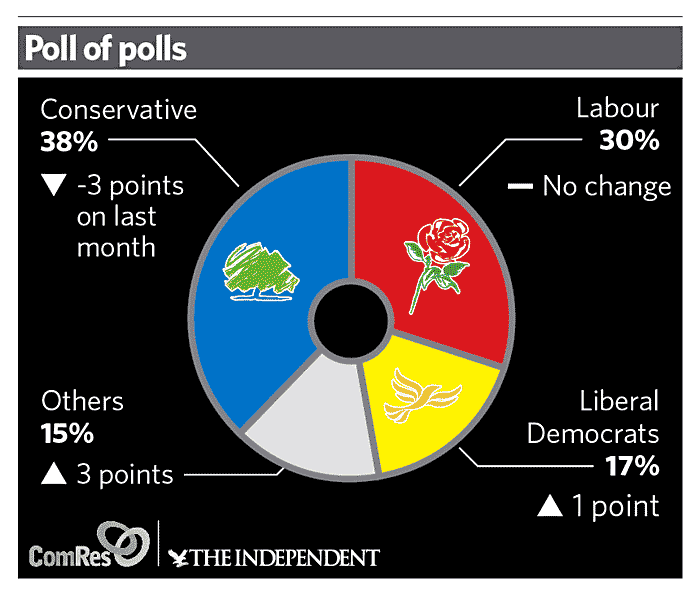Tories' poll lead slips despite Brown's woes

Your support helps us to tell the story
From reproductive rights to climate change to Big Tech, The Independent is on the ground when the story is developing. Whether it's investigating the financials of Elon Musk's pro-Trump PAC or producing our latest documentary, 'The A Word', which shines a light on the American women fighting for reproductive rights, we know how important it is to parse out the facts from the messaging.
At such a critical moment in US history, we need reporters on the ground. Your donation allows us to keep sending journalists to speak to both sides of the story.
The Independent is trusted by Americans across the entire political spectrum. And unlike many other quality news outlets, we choose not to lock Americans out of our reporting and analysis with paywalls. We believe quality journalism should be available to everyone, paid for by those who can afford it.
Your support makes all the difference.The Conservative Party's lead over Labour has narrowed despite Gordon Brown's difficult start to 2008, according to an opinion poll for The Independent.
In the first survey conducted since Peter Hain's resignation from the Cabinet, ComRes gives the Tories an eight-point lead but that would leave David Cameron 15 seats short of an overall majority in a hung parliament. Last month, his party enjoyed an 11-point advantage with ComRes, putting it on course for a majority of 46.
The poll, taken at the weekend, shows the Tories on 38 per cent (down three points on December), Labour on 30 per cent (unchanged), the Liberal Democrats on 17 per cent (up one point) and other parties on 15 per cent (up three). If repeated at a general election, the Tories would win 311 seats, Labour 264 and the Liberal Democrats 44.
The Tories' slimmer lead will fuel the debate inside the party over whether it should be profiting more from Gordon Brown's troubles over Labour funding, Northern Rock and the economy. It will boost Labour's hopes of being able to bridge the gap in the polls if the Government can get back on the front foot.
Other recent polls have also shown a modest Tory retreat. The party's senior figures are divided between those who want to press home its advantage and launch an all-out attack on Labour and others who favour a more cautious approach, arguing the Opposition should focus on reassuring voters because the election is a long way off.
According to ComRes, the Tories have a commanding lead over Labour (by 47 per cent to 26 per cent) among the top AB social group. But they've not yet made a breakthrough in the crucial C2 skilled manual workers who helped Margaret Thatcher win and retain power. Among that group, the Tories are only one point ahead (35 per cent to 34 per cent). Nor is Mr Cameron yet appealing strongly to the under-45s. Although his party is ahead among the 18-24 year olds, it trails Labour among 25-34-year-olds and 35-44 year-olds. But the Tories are well ahead (by 50 per cent to 28 per cent) among people aged 65 and over, who are the most likely group to vote.
The Tories enjoy big leads over Labour in the South-east, Midlands and Wales and the South-west and are neck and neck in Labour's traditional heartland in the North. The only region where Labour is ahead of the Tories is Scotland and even there it trails the Scottish National Party.
The ComRes findings suggest Nick Clegg, the new leader of the Liberal Democrats, has not made a dramatic early impact. His party's support is up one point on last month but the number of people who regard themselves as natural Liberal Democrats and who say they will vote for the party has dropped from 73 per cent to 68 per cent.
Conservative "identifiers" are the most loyal, with 90 per cent saying they will vote for the party – compared with 77 per cent of Labour "identifiers". Tory supporters are also most likely to turn out. Almost three in four (74 per cent) say they are absolutely certain to vote, compared to 56 per cent of Labour supporters and 57 per cent of Liberal Democrats. As Labour and the Tories try to woo Liberal Democrat supporters, it appears they are slightly more likely to back Mr Cameron's party than Mr Brown's. Some 13 per cent said they intended to vote Tory and 11 per cent Labour.
ComRes phoned 1,003 adults on 25-27 January 2008. Data was weighted by past vote recall. ComRes is a member of the British Polling Council and abides by its rules. Full tables at www.comres.co.uk .
Andrew Grice on the issues of the day: independent.co.uk/todayinpolitics
Join our commenting forum
Join thought-provoking conversations, follow other Independent readers and see their replies
Comments